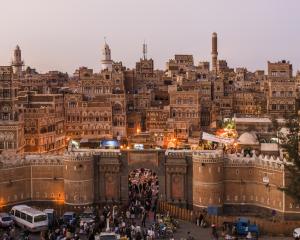
A Saudi-led alliance of Arab states launched an attack on Yemen's main port city on Wednesday (local time) in the largest battle of the war, aiming to bring the ruling Houthi movement to its knees at the risk of worsening the world's biggest humanitarian crisis.
Arab warplanes and warships pounded Houthi fortifications to support ground operations by foreign and Yemeni troops massed south of the port of Hodeidah in operation "Golden Victory".
Fighting raged near Hodeidah airport and al-Durayhmi, a rural area 10km south of the city, media controlled by the Arab states and their Yemeni allies reported.
The United Arab Emirates' state news agency reported that UAE forces and local allies had penetrated the Houthis' front line on the airport perimeter.
So far the Arab states have not tried to capture such a heavily-defended major city since joining the war three years ago against the Iran-aligned Houthis, who control Sanaa and most of the populated areas.
The Saudi-led coalition's plan is to take control only of the airport and seaport, plus the route leading to the Yemeni capital of Sanaa, spokesman Turki al-Maliki said. "We will not fight a street war with the Houthis in Hodeidah city, for the safety of civilians," he told al-Hadath TV.

The Houthis said they had a repelled a sea landing near the port by forces from Saudi Arabia and the UAE. "The Saudi coalition has not advanced at all in Hodeidah," Dayfallah al-Shami, a member of the movement's political bureau, told the Lebanese TV channel al-Mayadeen.
Yemen is suffering a humanitarian crisis that eclipses even Syria's. The United Nations says 22 million Yemenis are in need of humanitarian aid, with 8.4 million on the verge of famine - a figure that could rise to 10 million by the end of this year, For most the port is the only route for food supplies.
Despite the fighting, the UN kept up its aid supplies. "We are there and delivering, we are not leaving Hodeidah," Lise Grande, UN humanitarian coordinator for Yemen, said.
"We have a ship offloading food even as shelling and bombing is happening. Humanitarians will not walk away," she told Reuters by telephone from Sanaa.
The UN Security Council is due to meet behind closed doors on Thursday - at the request of Britain - over the attack, diplomats said.
The Houthis deployed military vehicles and troops in the city centre and near the port, as warplanes struck the coast to the south, a resident speaking on condition of anonymity told Reuters. People fled by routes to the north and west.
CARE International, one of the few aid agencies still there, said 30 air strikes hit the city within half an hour. "Some civilians are entrapped, others forced from their homes. We thought it could not get any worse, but unfortunately we were wrong," said CARE's acting country director, Jolien Veldwijk.
CALLS FOR RESTRAINT
The UN special envoy to Yemen, Martin Griffiths, said the world body was talking to both sides to try to avert a battle. "We call on them to exercise restraint & engage with political efforts to spare Hodeidah a military confrontation," he tweeted.
The Arab states say they will try to keep the port running and can ease the crisis once they seize it by lifting import restrictions they have imposed.
Western countries have quietly backed the Arab states diplomatically, while mostly avoiding direct public involvement in the conflict. The United States, Britain and France all sell billions of dollars of weapons a year to the Arab countries.
Houthi leader Mohammed Ali al-Houthi criticised the Gulf Arabs' western allies. "The British told us a week ago that the Emiratis and the Saudis had told them they would not enter the battle of Hodeidah without their agreement and assistance," he said. "So we hold them and America responsible."
In London, Foreign Secretary Boris Johnson said the British government was in contact with the coalition about ensuring its operations comply with international law on protecting civilians. These should "not disrupt commercial and humanitarian flows through the port", he said in a statement.
In Washington, the State Department's top Middle East official, David Satterfield, told lawmakers the United States is not assisting the operation in Hodeidah. However, it was unclear if that applied to continuing assistance to the coalition that Washington provides in the form of aircraft refuelling and intelligence support.
The operation began after a three-day deadline set by the UAE for the Houthis to quit the port.
"The liberation of the port is the start of the fall of the Houthi militia and will secure marine shipping in the Bab al-Mandab strait and cut off the hands of Iran, which has long drowned Yemen in weapons that shed precious Yemeni blood," Yemen's Arab-backed government-in-exile said in a statement.
A Yemeni anti-Houthi military official said the alliance had brought to bear a 21,000-strong force. It includes Emirati and Sudanese troops as well as Yemenis, drawn from southern separatists, local Red Sea coast fighters and a battalion led by a nephew of late ex-president Ali Abdullah Saleh.
The Sunni Muslim Arab states see the Houthi rise as expansionism by their Shi'ite foe Iran. They aim to restore Hadi, who was driven into exile in 2014.
The Houthis, from a Shi'ite minority, say they took power through a popular revolt and are defending Yemen from invasion.












